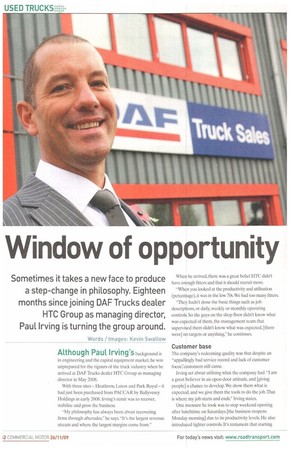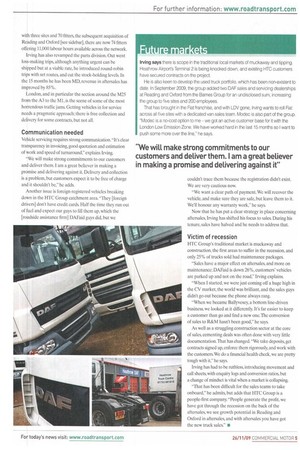Window of opportunity
Page 52

Page 53

If you've noticed an error in this article please click here to report it so we can fix it.
Sometimes it takes a new face to produce a step-change in philosophy. Eighteen months since joining DAF Trucks dealer HTC Group as managing director, Paul Irving is turning the group around.
Words / Images: Kevin Swallow
Although Paul Irving 's background is in engineering and the capital equipment market, he was unprepared for the rigours of the truck industry when he arrived at DAF Trucks dealer HTC Group as managing director in May 2008.
With three sites Heathrow, Luton and Park Royal it had just been purchased from PACCAR by Ballyvesey Holding in early 2008. Irving's remit was to recover, stabilise and grow the business.
"My philosophy has always been about recovering firms through aftersales," he says. "It's the largest revenue stream and where the largest margins come from." When he arrived, there was a great belief HTC didn't have enough fitters and that it should recruit more.
-When you looked at the productivity and utilisation (percentage), it was in the low 70s. We had too many fitters.
"They hadn't done the basic things such as job descriptions, or daily, weekly or monthly operating controls. So the guys on the shop floor didn't know what was expected of them, the management team that supervised them didn't know what was expected, [there were] no targets or anything," he continues
Customer base
The company's redeeming quality was that despite an "appallingly bad service record and lack of customer focus7customers still came.
Irving set about utilising what the company had. "I am a great believer in an open-door attitude, and [giving peoplel a chance to develop. We show them what is expected. and we give them the tools to do the job. That is where my job starts and ends," Irving states, One measure he took was to stop weekend opening after lunchtime on Saturdays [the business reopens Monday morning] due to its productivity levels. He also introduced tighter controls. It's testament that starting with three sites and 70 fitters, the subsequent acquisition of Reading and Oxford [see sidebar], there are now 74 fitters offering 11,000 labour hours available across the network.
Irving has also revamped the parts division. Out went loss-making trips, although anything urgent can be shipped but at a viable rate, he introduced round-robin trips with set routes, and cut the stock-holding levels. In the 15 months he has been MD, revenue in aftersales has improved by 85%.
It.ondon, and in particular the section around the M25 from the A3 to the Ml, is the scene of some of the most horrendous traffic jams. Getting vehicles in for service needs a pragmatic approach: there is free collection and delivery for some contracts, but not all.
Ccpmmunication needed
Ve 'cle servicing requires strong communication. "It's clear trahsparency in invoicing, good quotation and estimation of work and speed of turnaround," explains Irving.
"We will make strong commitments to our customers and deliver them. I am a great believer in making a promise and delivering against it. Delivery and collection is a problem, but customers expect it to be free of charge and it shouldn't be," he adds.
Another issue is foreign-registered vehicles breaking down in the HTC Group catchment area. "They [foreign drivers] don't have credit cards. Half the time they run out of fuel and expect our guys to fill them up, which the [roadside assistance firm] DAFaid guys did, but we couldn't trace them because the registration didn't exist. We are very cautious now.
"We want a clear path of payment. We will recover the vehicle, and make sure they are safe, but leave them to it. We'll honour any warranty work," he says.
Now that he has put a clear strategy in place concerning aftersales, Irving has shifted his focus to sales. During his tenure, sales have halved and he needs to address that.
Victim of recession
HTC Group's traditional market is muckaway and construction, the first areas to suffer in the recession, and only 25% of trucks sold had maintenance packages.
"Sales have a major effect on aftersales, and more on maintenance; DAFaid is down 26%, customers' vehicles are parked up and not on the road." Irving explains.
"When I started, we were just coming off a huge high in the CV market, the world was brilliant, and the sales guys didn't go out because the phone always rang.
"When we became Ballyvesey, a bottom line-driven business, we looked at it differently. It's far easier to keep a customer than go and find a new one. The conversion of sales to R&M hasn't been good," he says.
As well as a struggling construction sector at the core of sales, cementing deals was often done with very little documentation. That has changed. -We take deposits, get contracts signed up, enforce them rigorously, and work with the customers. We do a financial health check, we are pretty tough with it," he says.
Irving has had to be ruthless, introducing movement and call sheets, with enquiry logs and conversion ratios, but a change of mindset is vital when a market is collapsing.
"That has been difficult for the sales teams to take onboard," he admits, but adds that HTC Group is a people-first company. "People generate the profit, we have got through the recession on the back of the aftersales, we see growth potential in Reading and Oxford in aftersales, and with aftersales you have got the new truck sales." •








































































































































